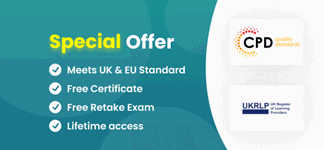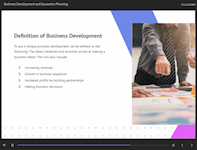Business Development Training
CPD Certified I Free PDF & Hardcopy Certificate included I Free Retake Exam | Instant Access | Lifetime Access
Training Express Ltd
Summary
- Certificate of completion - Free
- Certificate of completion - Free
- Exam(s) / assessment(s) is included in price
- Tutor is available to students
Add to basket or enquire
Overview
This Business Development course is designed for Business Developers, Analysts, Consultants, Administrators, Advisors, Office Managers, Line Managers, Administration Managers, Directors,Project Managers.
This thoroughly guided course will take you through marketing, common marketing types, successful planning which will lead to business development, process, supply chain, project and procurement management, business analysis planning and monitoring, planning and forecasting operations. You will also learn strategic analysis, analysing problems, analysing solutions, strategic development, selecting solutions, retail pricing, selling in multiple channels and generating solutions using the blink method, six thinking hats, brainwriting, mind mapping and many more.
Additionally, we will ensure you explore and gain communication skills, time and conflict management skills, administrative skills, identifying and managing risks through risk assessment and various negotiation techniques. Lastly, you will grasp talent and quality management skills, brainstorming skills, and etiquette skills that will help you represent your boss and your company.
Learning Outcomes
By the end of the course, learners will be able to:
- Deepen their knowledge on how to plan for business development effectively
- Familiarise themselves with process and supply chain management
- Get familiar with procurement, purchasing and project management
- Learn how to set retail pricing and selling in multiple channels
- Acquire the skills required to conduct strategic analysis, planning and monitoring
- Know how to analyse issues and come up with the right solution with a complete analysis
- Learn and gain various skills like negotiation techniques, communication skills, brainstorming skills and many more
- Know etiquettes that will help build strong business relationships
Key Features of the Business Development Course:
- CPD Certified
- Instant e-certificate and hard copy dispatch by next working day
- Fully online, interactive course with audio voiceover
- Self-paced learning and laptop, tablet, smartphone-friendly
- 24/7 Learning Assistance
- Discounts on bulk purchases
*** Additional Gifts ***
- Free Life Coaching Course
*** (Offer Ends Soon) ***
CPD
Course media
Description
Course Curriculum
The detailed curriculum outline of this course is as follows:
***Business Development***
Module 1:
Business Development and Succession Planning
- SWOT Analysis
- Understanding the value of Succession Planning
- Development of a Succession Plan
Module 2:
Process Management
- Elements of Enterprise Content Management
- Business Process Re-Engineering Model
- The Business Process Management Life Cycle
Module 3:
Supply Chain Management
- The Structure of a Supply Chain
- Flows of Supply Chain
Module 4:
Planning & Forecasting Operations
- Demand and Forecasting
- Forecasting Methods
- Aggregate Planning
- Planning for Product Pricing
- Credit Risk Management
Module 5:
Procurement & Purchasing Management
- Objectives of Procurement
- Procurement Organisation
- Objectives of Purchase
- Logistics Design
Module 6:
Project Management
- Constraints of a Project
- Understanding the Project Life Cycle
Module 7:
Retail Pricing
- Retail Market Levels – Mass Market, Middle-Market and Luxury
- Retail Pricing – Objectives and Strategies
- Price Elasticity
- Markdowns: Seasonal Sales, Reductions and Offers
Module 8:
Business Analysis Planning and Monitoring
Module 9
Strategic Analysis and Product Scope
- Strategy Development
- Porter’s Five Forces model
- Competitive Strategy Analysis
Module 10:
Quality Management
- Creating the Quality Management Plan
- Implementing Quality Project Management
- Benefit/Cost Analysis
- Quality Assurance Applying
- Quality Control Implementation
Module 11:
Management Skills for Leading Your Team
- Dealing With Issues Within Your Team
- The Art of Correct Communication
Module 12:
Selling in Multiple Channels
- Mail order
- Direct marketing
- Online retailing
- Consumer engagement
- Long-tail effect
- Fulfilment and delivery systems
- Multichannel retailing
Module 13:
Representing Your Boss and Company
- Leadership Competence Anatomy
- Five Stages of Competence
- Aspects of Competence
- Importance of Professionalism at Work
Module 14:
Preparing for Brainstorming
- Removing Mental Blocks
- Stimulating Creativity
Module 15:
Generating Solutions (I)
- Brainwriting and Mind Mapping
- Duncker Diagrams
Module 16:
Generating Solutions (II)
- The Morphological Matrix
- The Six Thinking Hats
- The Blink Method
Module 17:
Analysing Solutions
- Analysing Wants and Needs
- Using Cost/Benefit Analysis
Module 18:
Selecting a Solution
- Doing a Final Analysis
- Paired Comparison Analysis
Module 19:
Negotiation Techniques
- Basic Types of Negotiations
- Phases of Negotiation
- Negotiation Techniques
- Strategies for Identifying Mutual Gain
- Effective Negotiation Practise
- Negotiation on Behalf of Others
Module 20:
Communication Skills
- Effective Listening Skills
- Verbal Communication
- Non-Verbal Communication
- Communication Strategies
Module 21:
Skills of an Effective Administrator
- The ‘Three Skills Approach’
- Technical Skills
- Human Skills
- Conceptual Skills
Module 22:
What is Marketing?
Module 23:
Common Marketing Types (I)
- Direct Marketing
- Active Marketing
- Incoming Marketing
- Outgoing Marketing
Module 24:
Common Marketing Types (II)
- Guerrilla Marketing
- B2B Marketing
- B2C Marketing
- Promotional Marketing
Module 25:
Conflict Management
- Introduction
- Understand the Keys to Conflict
- How Misunderstandings Arise and the Solution
- Personality Types in Conflict
- Escalation of Conflict
- De-escalating Conflict
- Closing Section
Module 26:
Talent Management
Module 27:
Time Management
- Prioritising the Workload
- The Pareto Principle and Tips
Module 28:
Managing Risk and Recovery
- Creating the Risk Management Plan
- Identifying Risks
Module 29:
Business Etiquette
- Business Etiquette and Corporate Culture
- Builds Strong Relationships
Accreditation
All of our courses, including this course, are fully accredited, providing you with up-to-date skills and knowledge and helping you to become more competent and effective in your chosen field.
Certification
Once you’ve successfully completed your course, you will immediately be sent a digital certificate. Also, you can have your printed certificate delivered by post (shipping cost £3.99). Our certifications have no expiry dates, although we do recommend that you renew them every 12 months.
Assessment
At the end of the course, there will be an online assessment, which you will need to pass to complete the course. Answers are marked instantly and automatically, allowing you to know straight away whether you have passed. If you haven’t, there’s no limit on the number of times you can take the final exam. All this is included in the one-time fee you paid for the course itself.
Who is this course for?
Anyone with a knack for learning new skills can take this course. While this comprehensive training is popular for preparing people for job opportunities in the relevant fields, it also helps to advance your career for promotions.
Requirements
Learners do not require any prior qualifications to enrol on this course.
Career path
This course will lead you to many different career opportunities, here are few prospects:
- Business Developer: £46,000 - £60,000 per annum
- Analyst: £40,000 - £65,000 per annum
- Consultant: £52,000 - £66,000 per annum
- Project Manager: £46,000 - £70,000 per annum
Questions and answers
Currently there are no Q&As for this course. Be the first to ask a question.
Certificates
Certificate of completion
Digital certificate - Included
Certificate of completion
Hard copy certificate - Included
You will get the hard copy certificates for Free! The delivery charge of the hard copy certificate inside the UK is £3.99 each.
Reviews
Currently there are no reviews for this course. Be the first to leave a review.
Legal information
This course is advertised on reed.co.uk by the Course Provider, whose terms and conditions apply. Purchases are made directly from the Course Provider, and as such, content and materials are supplied by the Course Provider directly. Reed is acting as agent and not reseller in relation to this course. Reed's only responsibility is to facilitate your payment for the course. It is your responsibility to review and agree to the Course Provider's terms and conditions and satisfy yourself as to the suitability of the course you intend to purchase. Reed will not have any responsibility for the content of the course and/or associated materials.




